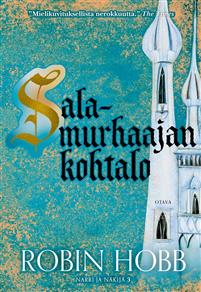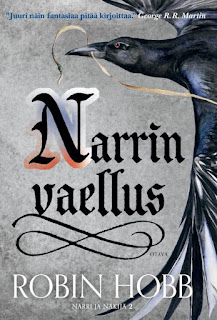Uuden sarjan ensimmäinen osa. Toimittaja Saana on saanut potkut. Jollain tasolla hän on potkuihinsa ihan tyytyväinen, sillä hän oli kyllästynyt kirjoittamaan tyhjänpäiväisiä “top viisi vinkkiä kesäkuntoon pääsemiseen” -tyyppisiä juttuja. Hän on päättänyt viettää kesän tätinsä luona Hartolassa, rentoutua, toipua osittaisesta loppuunpalamisesta ja vasta syksyllä etsiä uutta työtä. Tädiltään hän kuulee paikallisesta mysteeristä – nuoresta tytöstä, joka löytyi koskesta kuolleena reilut parikymmentä vuotta sitten. Asia oli jäänyt avoimeksi, ja oli epäselvää, miten tyttö oli kuollut. Poliisi oli epäillyt ilmeisesti lähinnä itsemurhaa, jota tytön tunteneet pitivät käytännössä mahdottomana. Saana saa inspiraation tutkia tapausta ja ehkä kirjoittaa asiasta kirjan tai julkaista tutkimuksensa true crime -podcastina.
Samaan aikaan Helsingissä rikosylikomisario Jan tutkii Suomenlinnassa tapahtunutta murhaa, jossa mainostoimiston nuorista naisista liikaakin pitänyt pomo on murhattu ritualistisella tavalla. Hän on hukkunut, mutta löytyy kuivalta maalta, ja hänen jalkojensa väliin on poltettu kruunua muistuttava polttomerkki. Kun löytyy toinen tapettu mies, pankinjohtaja – tällä kertaa Hartolasta – näyttää siltä, että liikkeellä on sarjamurhaaja. Mutta miten uhrit on valittu? Heidän välillään ei näytä olevan mitään yhteyttä.
Saana ja Jan päätyvät yhteisten tuttavien parittamina sokkotreffeille, jotka lopulta venyvät pitkälle aamuyöhön, ja molemmat ovat vahvasti vaikuttuneita toisistaan. Kirja seuraa molempien rikosten ratkaisemista, osittain takautumina kuolleen tytön viimeisestä kesästä. Asiat alkavat vähitellen näyttää olevan yhteydessä toisiinsa. Mutta kuka on ottanut tehtäväkseen kostaa vuosia sitten tapahtuneita asioita?
Miellyttävä yllätys: kirja oli hyvin kirjoitettu, hyvällä kielellä ja siinä oli aika tuore ja kiinnostava juoni. Romantiikkaakin oli mukana, ehkä himppu liikaa, mutta ei haitaksi asti. Takaumat olivat hieman ahdistavia, koska tiesi, mitä tulee tapahtumaan. Pientä tiivistämistäkin olisi ehkä paikoitellen voinut toivoa. Yksi epäloogisuus jäi loppuun – en ymmärrä, miksi Saanan henki oli lopussa uhattuna. Eihän murhaajalla, jonka murhat olivat tiukan perusteltuja, ollut mitään häntä vastaan. Joka tapauksessa kirjasta jäi positiivinen tunnelma, ja varmaan jossain vaiheessa seuraavakin osa tulee automatkojen kuunteluun.
The first part of a new series. Journalist Saana has been fired. On some level, she’s quite pleased with being let go, as she had grown tired of writing trivial “top five tips to get fit for summer” type articles. She has decided to spend the summer at her aunt’s house in Hartola, planning to relax, recover from partial burnout, and only start looking for a new job in the fall. From her aunt, she hears about a local mystery – a young girl who was found dead in the rapids more than twenty years ago. The case remained unsolved, and it was unclear how the girl had died. The police suspected suicide, but those who knew the girl considered that practically impossible. Saana gets the idea to investigate the case and maybe write a book or publish her research as a true crime podcast.
Meanwhile, in Helsinki, Chief Inspector Jan is investigating a murder in Suomenlinna, where the boss of an advertising agency, who had been overly fond of young female employees, has been killed in a ritualistic manner. He had drowned but was found on dry land, with a crown-like branding burned between his legs. When a second victim is found – a bank manager, this time in Hartola – it starts to look like a serial killer is on the loose. But how were the victims chosen? There seems to be no connection between them.
Saana and Jan end up on a blind date set up by mutual friends, which stretches late into the night, and both are strongly impressed by one another. The book follows the solving of both crimes, partly through flashbacks to the last summer of the dead girl’s life. Gradually, it becomes clear that the cases are connected. But who has taken it upon themselves to avenge things that happened years ago?
A pleasant surprise: the book was well-written, with good language and a fresh, interesting plot. There was even some romance, perhaps a tad too much, but not to a bothersome degree. The flashbacks were a bit distressing, as you knew what was going to happen. There could have been some tightening of the narrative here and there. One inconsistency remained at the end – I don’t understand why Saana’s life was threatened. The killer, whose murders were strictly motivated, had no reason to go after her. Nevertheless, the book left a positive impression, and I will likely listen to the next installment during future road trips.
494 pp


























